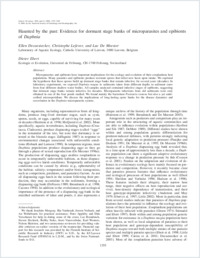Haunted by the past: evidence for dormant stage banks of microparasites and epibionts of Daphnia
- Decaestecker, Ellen Laboratory of Aquatic Ecology, Catholic University of Leuven, Belgium
- Lefever, Christophe Laboratory of Aquatic Ecology, Catholic University of Leuven, Belgium
- De Meester, Luc Laboratory of Aquatic Ecology, Catholic University of Leuven, Belgium
- Ebert, Dieter Ecology and Evolution, Department of Biology, University of Fribourg, Switzerland
-
2004
Published in:
- Limnology and Oceanography. - 2004, vol. 49, no. 4, p. 1355-1364
English
Microparasites and epibionts have important implications for the ecology and evolution of their zooplankton host populations. Many parasites and epibionts produce resistant spores that infect new hosts upon intake. We explored the hypothesis that these spores build up dormant stage banks that remain infective for several years (decades). In laboratory experiments, we exposed Daphnia magna to sediments taken from different depths in sediment cores from four different shallow water bodies. All samples analyzed contained infective stages of epibionts, suggesting that dormant stage banks remain infective for decades. Microparasite infections from old sediments were only obtained in one of the four ponds studied. We found mainly the bacterium Pasteuria ramosa but also a yet undescribed microsporidium. We discuss the implications of long-lasting spore banks for the disease dynamics and coevolution in the Daphnia–microparasite system.
- Faculty
- Faculté des sciences et de médecine
- Department
- Département de Biologie
- Language
-
- English
- Classification
- Ecology and biodeversity
- License
- License undefined
- Identifiers
-
- RERO DOC 4119
- DOI 10.4319/lo.2004.49.4_part_2.1355
- Persistent URL
- https://folia.unifr.ch/unifr/documents/299609
Statistics
Document views: 103
File downloads:
- 1_ebert_hpe.pdf: 159
